By – James M. Katz, BA
Forensic nursing training has emerged as a critical field at the intersection of healthcare and criminal justice. This specialized education equips nurses with the skills to care for victims of violence while collecting and preserving evidence crucial for legal proceedings. As incidents of assault, abuse, and other violent crimes continue to impact communities, the demand for forensic nurses with expertise in areas like forensic photography, traumatology, and victim advocacy has grown significantly.
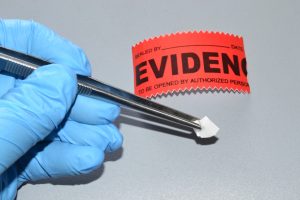 Comprehensive forensic nursing programs prepare students to excel in this challenging yet rewarding career path. Through coursework covering forensic science, victimology, and the role of the sexual assault nurse examiner, aspiring forensic nurses gain a solid foundation. Hands-on learning experiences allow them to practice evidence collection techniques and develop critical thinking skills essential for analyzing complex cases. The training also emphasizes interprofessional collaboration, enabling graduates to work effectively with law enforcement, attorneys, and other stakeholders in the criminal justice system.
Comprehensive forensic nursing programs prepare students to excel in this challenging yet rewarding career path. Through coursework covering forensic science, victimology, and the role of the sexual assault nurse examiner, aspiring forensic nurses gain a solid foundation. Hands-on learning experiences allow them to practice evidence collection techniques and develop critical thinking skills essential for analyzing complex cases. The training also emphasizes interprofessional collaboration, enabling graduates to work effectively with law enforcement, attorneys, and other stakeholders in the criminal justice system.
Key Takeaways
- Forensic nurses play a key role in both healthcare and the legal system, providing care to victims and collecting evidence.
- Educational pathways for forensic nurses include basic nursing education, specialized programs, and advanced degrees.
- Key skills for forensic nurses include clinical abilities, legal knowledge, and emotional support.
- Certification and licensure are important for career advancement and require specific training and exams.
- Forensic nursing offers diverse career opportunities but also comes with emotional and ethical challenges.
Understanding Forensic Nursing
Definition and Scope
Forensic nursing is a unique field that blends healthcare with the legal system. Forensic nurses provide care to victims of crimes while also collecting evidence that can be used in legal cases. This specialty requires a deep understanding of both medical and legal principles to effectively support patients and aid in investigations.
Roles and Responsibilities
Forensic nurses have a wide range of duties. They treat injuries, collect evidence, and may even testify in court. They often work with victims of violence, abuse, and other traumatic events. Their role is crucial in ensuring that victims receive the care they need while also helping to bring perpetrators to justice.
Importance in Healthcare and Legal Systems
The work of forensic nurses is vital in both healthcare and legal systems. They provide essential medical care to victims, which can be life-saving. At the same time, they gather evidence that can be critical in legal proceedings. This dual role makes forensic nursing an indispensable part of both fields.
The Evolution of Forensic Nursing
Historical Context
The roots of forensic nursing can be traced back to ancient civilizations. Egyptian and Hindu medicine demonstrated an understanding of poisons and toxicology, while Greek and Roman civilizations applied forensic principles to injury patterns and cause of death determinations. However, the formal integration of forensics into nursing practice emerged much later.
In the 1950s, the United Kingdom saw early examples of forensic nursing practice. Healthcare professionals, including nurses, often collaborated with law enforcement to provide healthcare and forensic medicine to individuals in custody. This partnership laid the groundwork for the development of forensic nursing as a specialized field.
The United States witnessed the earliest documented aspects of forensic nursing in the 1970s, with a focus on nursing care for sexual assault victims. Nurse Ann Burgess and sociologist Lynda Holstrom made significant contributions during this period, conducting extensive research on sexual assault victims and developing the concept of rape trauma syndrome.
Modern Developments
The 1980s marked a turning point for forensic nursing. Virginia Lynch, considered one of the founders and authorities in the field, played a crucial role in establishing forensic nursing as a specialty. She developed the forensic nursing curriculum and model, paving the way for standardized practice and education in this emerging field.
In 1991, forensic nursing gained recognition as a scientific discipline by the American Academy of Forensic Sciences https://www.aafs.org/article/presidential-spotlight-forensic-nursing-science-section. This acknowledgment was a significant milestone, validating the importance of forensic nursing in bridging the gap between healthcare and the criminal justice system.
The formation of the International Association of Forensic Nurses (IAFN) in 1992 further solidified the profession’s standing . This organization provided a platform for forensic nurses to collaborate, share knowledge, and advance their practice. In 1995, the American Nurses Association granted specialty status to forensic nursing, cementing its position within the broader nursing profession.
One of the most notable developments in forensic nursing has been the establishment of Sexual Assault Nurse Examiner (SANE) programs. These programs, which began in the early 1970s, aimed to address the inadequate services provided to sexual assault victims in emergency departments. The first SANE programs were established in Memphis, Tennessee (1976), Minneapolis, Minnesota (1977), and Amarillo, Texas (1979).
Future Trends
The future of forensic nursing looks promising, with several trends shaping its evolution. Technological advancements are playing a crucial role in enhancing forensic nursing practice. For instance, alternative light photography, such as the Omni chrome camera, allows forensic nurses to visualize bruising below the skin’s surface, aiding in quick and accurate assessment of physical damage.
The integration of artificial intelligence and digital documentation of physical findings is becoming increasingly important in forensic nursing education and practice. These technologies are enhancing the accuracy and efficiency of evidence collection and analysis.
Standardization efforts are also driving the field forward. In 2021, the Organization of Scientific Area Committees (OSAC) for forensic sciences launched a Forensic Nursing Subcommittee to draft standards for the evaluation and intervention of all forensic patients. This initiative aims to improve the quality of care for victims, prevent wrongful convictions, and ensure proper identification, collection, and preservation of evidence.
The role of forensic nurses is expanding beyond sexual assault cases. Forensic nurse examiners are now active in various subspecialties, including pediatric and adult forensic health, psychiatric mental health, nursing jurisprudence, death investigation, intimate partner violence, child and elder abuse, human trafficking, and refugee health. This diversification reflects the growing recognition of the value forensic nurses bring to different areas of healthcare and criminal justice.
As the field continues to evolve, there is a growing emphasis on interdisciplinary collaboration and research. The development of middle-range theories, such as the constructed theory of forensic nursing care, is strengthening the scientific base of forensic nursing and supporting interdisciplinary research to further define and improve practice, education, and research.
Educational Pathways for Forensic Nurses
Basic Nursing Education Requirements
To start a career in forensic nursing, you first need to become a registered nurse (RN). This usually means getting a Bachelor of Science in Nursing (BSN) degree. Some people start with an associate degree, but a BSN offers more opportunities and specialized classes. Excelling in high school subjects like biology and chemistry can also help you get into a good nursing program.
Specialized Forensic Nursing Programs
After becoming an RN, you can take specialized courses in forensic nursing. These programs teach you how to handle evidence, work with victims, and even testify in court. Some universities offer certificate programs that can be completed in less than a year. These courses cover topics like forensic photography and domestic violence.
Advanced Degrees and Certifications
For those who want to go further, a master’s degree in forensic nursing is a great option. Schools like Texas A&M offer programs that include hands-on training and courses in public policy and victimology. Advanced certifications, like the Advanced Forensic Nurse Board-Certified (AFN-BC), require more experience and education but can open doors to higher-paying jobs and leadership roles.
Key Components of Forensic Nursing Programs
Scientific Foundations
Forensic nursing programs are built upon a strong scientific foundation that has evolved over time. The theoretical basis for forensic nursing was first established through the integrated practice model for forensic nursing science, developed by Virginia Lynch as her master’s thesis project. This conceptual model played a pivotal role in establishing forensic nursing as both a nursing and forensic specialty.
As the field has grown, the theoretical basis has progressed beyond a conceptual model. In 2014, a critique of the integrated practice model for forensic nursing science was published, with Virginia Lynch supporting the advancement to a more defined theory, specifically a middle-range theory, to support the growth of forensic nursing science.
The constructed theory of forensic nursing care: a middle-range theory builds upon the constructs within the established conceptual model. This theory incorporates additional theories that support forensic nursing care, integrating nursing theories with theories from other disciplines. This approach provides a platform for future growth in the field.
A key aspect of the scientific foundations is the incorporation of the biopsychosocial model, which frames the current state of forensic nursing. This model connects forensic nursing practice throughout the world, reaffirming that the grounding of forensic nursing is in health care and improved patient care outcomes.
Clinical Skills
Forensic nursing programs place a strong emphasis on developing essential clinical skills. These skills are crucial for providing comprehensive care to victims of violence and collecting evidence for legal proceedings.
One of the core clinical skills taught is the proper performance of a forensic sexual assault exam. This includes:
1. Differentiating specific structures of the female genital anatomy
2. Demonstrating the proper use of a catheter for hymen visualization
3. Performing speculum examinations
4. Collecting cultures for sexually transmitted infections
5. Conducting clinical photography to document findings
Programs also focus on developing skills in trauma-informed care. Forensic nurses learn to apply six key principles across various situations and settings: safety; trustworthiness and transparency; peer support; collaboration and mutuality; empowerment, voice and choice; and cultural, historical, and gender issues. These principles are essential for improving healthcare outcomes of patients and avoiding secondary traumatization of forensic nurses and interdisciplinary partners.
Legal Education
A critical component of forensic nursing programs is legal education. Forensic nurses work at the intersection of nursing and the criminal justice system, requiring a solid understanding of legal processes and procedures.
Legal education in these programs covers:
1. Evidence collection and preservation techniques
2. Documentation practices for legal purposes
3. Testifying in court proceedings
4. Understanding the role of forensic nurses in the criminal justice system
Forensic nurses learn to collect evidence and give testimony that can be used in a court of law to apprehend or prosecute perpetrators who commit violent and abusive acts. They also receive training in providing consultation and testimony for civil and criminal proceedings relative to nursing practice, care given, and opinions rendered regarding findings.
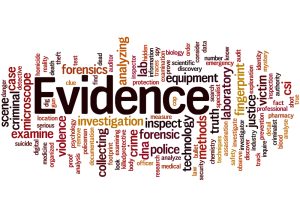 Some programs offer advanced legal education, with options for double master’s degrees in nursing and criminal justice. This comprehensive legal education prepares forensic nurses to work effectively within both healthcare and legal systems, ensuring they can provide specialized care while meeting evidentiary needs.
Some programs offer advanced legal education, with options for double master’s degrees in nursing and criminal justice. This comprehensive legal education prepares forensic nurses to work effectively within both healthcare and legal systems, ensuring they can provide specialized care while meeting evidentiary needs.
By integrating scientific foundations, clinical skills, and legal education, forensic nursing programs prepare nurses to work in various settings, including hospitals, community anti-violence programs, coroner’s and medical examiners offices, corrections institutions, and psychiatric hospitals. This comprehensive training enables forensic nurses to provide specialized care for patients experiencing acute and long-term health consequences associated with victimization or violence, while also contributing to anti-violence efforts and the legal system.
Hands-On Learning Experiences
Forensic nursing training programs emphasize practical, hands-on learning experiences to prepare students for the challenges they will face in their careers. These experiences allow students to apply theoretical knowledge in realistic scenarios, developing critical skills and confidence.
Simulated Crime Scenes
Simulated crime scenes are a cornerstone of forensic nursing education, providing students with immersive learning opportunities. These exercises allow students to practice evidence collection, documentation, and analysis in a controlled environment. In one example, senior nursing and science students participated in a forensic simulation that involved caring for patients suspected of being victims of abuse or requiring forensic evidence collection.
The simulation, a collaboration between the College of Arts & Sciences and the School of Nursing, took place in a simulation center and involved several key components:
1. An overview of forensic science, crime scene security, and procedures
2. Introduction to a simulated patient case
3. Evidence gathering from the patient
4. Handover of evidence to the Department of Public Safety
5. Analysis of evidence in a chemistry lab
6. Debriefing session with students and faculty
This interdisciplinary approach allowed students to experience the full spectrum of forensic investigation, from initial patient contact to evidence analysis. As one student noted, “My biggest takeaway was how much interdisciplinary collaboration happens in these scenarios. Nurses, chemists, and law enforcement were all a part of the simulation. Everyone had an important role in the simulation and without one the task at hand would not have been done”.
Some programs are incorporating advanced technology to enhance these simulations. For instance, the VB Suite application allows instructors to create customized crime scenes with features such as:
• Annotated 3D models simulating injuries or organ damage
• QR codes placed around the scene for students to scan and access additional information
• Augmented reality (AR) capabilities for a more interactive experience
Mock Trials
Mock trials are another crucial component of forensic nursing training, preparing students for the legal aspects of their role. These exercises simulate courtroom proceedings, allowing students to practice testifying and familiarize themselves with legal processes.
In 2018, Albany Medical Center incorporated a mock trial component into their Sexual Assault Forensic Examiner 40-hour training curriculum. This program includes:
1. An educational session covering legal terminology, court settings, and the expectations of expert witness testimony
2. A simulated trial in an actual courtroom, with attorneys playing various roles
3. Opportunities for each nurse to testify on the witness stand
4. Feedback from attorneys and the Sexual Assault Nurse Examiner coordinator
This hands-on experience helps nurses develop confidence in testifying and improves their understanding of how their documentation and evidence collection can impact legal proceedings.
Clinical Rotations
Clinical rotations provide forensic nursing students with real-world experience in healthcare settings. These rotations allow students to shadow and assist current registered nurses, applying their skills in actual patient care situations.
For forensic nursing students, certain clinical sites are particularly relevant:
• Emergency rooms
• Psychiatric units
• Behavioral health centers
• Medical-surgical units
• Pediatric hospitals
• Public health departments
These rotations help students develop core competencies and are often graded based on performance and skills demonstrated during the placement.
Some programs, such as the Master of Science in Nursing-Forensic Nursing track, require students to complete a specific number of clinical hours. For example, students may need to attend on-campus clinical experiences for courses like Advanced Health Assessment, completing 45 clinical hours in two separate visits.
It’s important to note that students may be responsible for obtaining their own preceptors for certain courses, typically in the final semester of the program. This requirement helps students develop professional networking skills and gain experience in different healthcare settings.
Through these hands-on learning experiences – simulated crime scenes, mock trials, and clinical rotations – forensic nursing students gain practical skills, confidence, and a deeper understanding of their future roles in healthcare and the legal system.
Developing Critical Thinking Skills
Forensic nursing training programs place a strong emphasis on developing critical thinking skills, which are essential for success in this complex field. These skills enable forensic nurses to analyze evidence, interpret findings, and make informed decisions in challenging situations.
Emotional and Psychological Support
Forensic nurses often deal with victims of trauma, so they must provide emotional and psychological support. They need to be compassionate and understanding, helping patients feel safe and cared for during difficult times. This support is vital for the healing process and can make a significant difference in the lives of victims.
Case Analysis
Case analysis is a fundamental aspect of developing critical thinking skills in forensic nursing. Through this process, nurses learn to examine complex scenarios and apply their knowledge to real-world situations. Forensic nurses are trained to review patient charts, participate in peer reviews, and engage in ongoing education to enhance their analytical abilities. These activities help them identify normal and abnormal findings, compare techniques and resources used for each patient, and discuss implications for practice changes based on case discussions.
One effective method for developing case analysis skills is through the review of sexual assault and strangulation cases. By examining a variety of cases from different programs, forensic nurses can:
1. Recognize the value of peer review and discussion
2. Identify normal and abnormal findings
3. Compare techniques and resources utilized for each patient
4. Discuss implications for practice changes based on case discussions
Evidence Interpretation
Evidence interpretation is a crucial skill for forensic nurses, as they play a pivotal role in crime scene evidence interpretation and analyzing physical and biological evidence to solve crimes . To develop this skill, forensic nursing programs focus on several key areas:
1. Understanding types of evidence: Forensic nurses learn to differentiate between physical evidence (e.g., wounds, fibers) and biological evidence (e.g., blood, saliva, semen).
2. Wound assessment: They are trained to determine the nature of injuries, considering factors such as size, depth, location, and patterns that may indicate the type of weapon used or the circumstances of the injury.
3. Biological evidence collection: Forensic nurses learn proper techniques for collecting and preserving biological samples, ensuring the integrity of DNA evidence.
4. Laboratory result interpretation: They develop the ability to understand and explain DNA profiles, toxicology reports, and blood spatter patterns.
5. Forensic photography: Nurses are trained in techniques to capture clear, accurate images of evidence that can be admissible in court.
Decision-Making Processes
Effective decision-making is essential in forensic nursing, as it impacts patient care, evidence collection, and legal proceedings. Forensic nursing programs help develop this skill through various approaches:
1. Evidence-based practice: Nurses are encouraged to incorporate evidence-based knowledge into their practice decisions, ensuring that their actions are supported by the latest research and best practices.
2. Ethical considerations: Forensic nurses are trained to consult and collaborate with appropriate ethical resources when making decisions that may have legal or moral implications.
3. Collaborative decision-making: Programs emphasize the importance of treating colleagues with respect, sharing ideas honestly, and giving credit for contributions, fostering a collaborative environment for decision-making.
4. Critical evaluation: Forensic nurses learn to ensure that their research and scientific contributions are thorough, accurate, and unbiased in design and presentation, developing a critical eye for evaluating information.
By focusing on these three key areas – case analysis, evidence interpretation, and decision-making processes – forensic nursing programs equip nurses with the critical thinking skills necessary to excel in their roles. These skills enable them to provide specialized care to victims of violence, contribute to criminal investigations, and serve as expert witnesses in legal proceedings. As the field continues to evolve, the development of these critical thinking skills remains essential for forensic nurses to adapt to new challenges and advancements in both healthcare and forensic science.
Interprofessional Collaboration Training
Forensic nursing training programs emphasize the importance of interprofessional collaboration, recognizing that effective care for victims of violence requires a coordinated effort across multiple disciplines. This training prepares forensic nurses to work seamlessly with law enforcement, legal professionals, and other healthcare providers to ensure comprehensive care and support for patients while maintaining the integrity of evidence collection and legal processes.
Working with Law Enforcement
Forensic nurses play a crucial role in bridging the gap between healthcare and law enforcement. Their training focuses on developing skills to collaborate effectively with police officers and detectives, ensuring that patient care is balanced with the needs of criminal investigations. This collaboration is pivotal in modern justice systems, especially in cases involving physical and sexual violence.
Key aspects of this training include:
1. Understanding the role of law enforcement in investigations
2. Learning effective communication strategies for sharing medical findings
3. Maintaining the chain of custody for evidence
4. Participating in regular briefings on the status of medical examinations and legal investigations
Forensic nurses learn to provide crucial links between medicine and the law, offering invaluable support to the criminal justice system. Their specialized training in evidence collection, preservation, and documentation procedures ensures that they can work effectively alongside law enforcement while prioritizing patient care.
Coordinating with Legal Professionals
Forensic nursing programs also prepare nurses to interact with legal professionals, recognizing the significant impact their work can have on legal proceedings. This training covers:
1. Understanding legal concepts relevant to healthcare, such as consent and confidentiality
2. Learning documentation standards that meet legal requirements
3. Preparing to provide expert testimony in court
Forensic nurses may serve as fact witnesses, testifying only to their direct interactions with patients and explaining their role and institutional protocols. With additional qualifications, they may also act as expert witnesses, providing opinions based on their expertise. Some forensic nurses may work as legal nurse consultants, helping attorneys understand the medical aspects of cases.
Multidisciplinary Team Approaches
A key component of forensic nursing training is learning to work within multidisciplinary teams (MDTs). These teams, also known as Sexual Assault Response Teams (SARTs) or Sexual Assault Response and Resource Teams (SARRTs), bring together various stakeholders to improve the community response to sexual assault.
MDTs typically include:
1. Forensic nurses
2. Advocates
3. Law enforcement officers
4. Prosecutors
5. Mental health providers
6. Social services professionals
The goal of these teams is to provide holistic, comprehensive, and trauma-informed care to individuals affected by violence. Forensic nursing programs teach students how to contribute effectively to these teams, emphasizing the importance of coordinated efforts in improving victims’ experiences and achieving better legal outcomes.
Training also addresses potential challenges in MDT functioning, such as:
1. Power dynamics within the team
2. The need to negotiate professional boundaries
3. The importance of clear communication and role definition
By preparing forensic nurses to work effectively in these collaborative environments, training programs ensure that they can contribute to a more coordinated and compassionate response to victims of violence while maintaining the highest standards of medical care and legal integrity.
Specializations within Forensic Nursing
Forensic nursing encompasses various specialized roles, each addressing specific aspects of healthcare within the legal system. This section explores three key specializations: Sexual Assault Nurse Examiners, Death Investigators, and Correctional Nursing.
Sexual Assault Nurse Examiners
Sexual Assault Nurse Examiners (SANEs) are specialized forensic nurses trained to work with patients who have experienced sexual assault, abuse, or incest. These professionals play a crucial role in providing comprehensive care to victims while also collecting and preserving evidence for legal proceedings.
SANEs have several responsibilities, including:
1. Performing and documenting sexual assault medical forensic interviews and exams
2. Providing emotional support and assessing the patient’s psychological state
3. Collecting forensic evidence, such as blood and urine samples, swabs, and photo documentation
4. Administering prophylactic medications and emergency contraception
5. Testifying as fact witnesses in court cases
To practice as a SANE, nurses must complete specialized training. The International Association of Forensic Nurses (IAFN) requires a minimum of 40 hours of classroom training and 40 hours of clinical work. Additionally, the IAFN offers SANE-A (adult) and SANE-P (pediatric) certifications for those meeting eligibility requirements.
Death Investigators
Forensic nurses can also specialize in death investigation, working alongside coroners and medical examiners. In the United States, death investigation responsibilities vary by jurisdiction, with some states employing coroners and others using medical examiners.
A forensically trained nurse can serve as an ideal alternative when a forensic physician is not available. Key components of death investigation include:
1. Gathering medical and social history
2. Examining the body
3. Conducting scene investigations
To qualify for this role, nurses should have extensive experience in emergency room or intensive care settings, which helps develop analytical assessment skills and the ability to handle psychosocial events surrounding unexpected or traumatic deaths. Additionally, certification through the American Board of Medicolegal Death Investigators (ABMDI) is recommended.
Correctional Nursing
Correctional forensic nurses provide healthcare to incarcerated individuals in various settings, including jails, prisons, and juvenile detention centers. These nurses face unique challenges in delivering care within the constraints of the criminal justice system.
Key responsibilities of correctional nurses include:
1. Conducting intake screenings for new inmates
2. Managing chronic care clinics for conditions such as hypertension and asthma
3. Administering medications through controlled processes
4. Providing episodic healthcare services through nursing sick calls
Correctional nursing differs between jails and prisons due to the varying lengths of inmate stays and the nature of healthcare needs. Jail nursing often focuses on urgent and emergent conditions, while prison nursing involves more long-term management of chronic conditions.
While entry-level nurses can work in correctional settings, the autonomous nature of the role and the need for excellent assessment skills make prior experience in general nursing practice, particularly in emergency or mental health settings, highly beneficial.
These specializations demonstrate the diverse roles forensic nurses can play in bridging healthcare and the legal system, providing critical services to vulnerable populations and supporting the administration of justice.
Technology in Forensic Nursing Education
The field of forensic nursing education has seen significant advancements in recent years, with technology playing a crucial role in enhancing the learning experience and preparing nurses for the challenges they will face in their careers. These technological innovations have revolutionized the way forensic nurses are trained, providing them with more immersive and practical learning experiences.
Digital Evidence Collection
In the digital age, forensic nurses must be well-versed in collecting and preserving digital evidence. The SAP model, considered the standard procedure for dealing with data-related wrongdoing, emphasizes the importance of securing evidence as the first step. This process involves making copies of relevant data storage devices, identifying hidden data areas, and restoring deleted data. Forensic nurses are trained to collect evidence from various sources, including:
1. Operating systems: Data on system versions, hardware, installation dates, and configurations
2. User information: Creation dates, logins, and user rights
3. Applications: Installation and uninstallation history
Additionally, forensic nurses learn to secure evidence from mobile devices, which can provide valuable information such as location data, communication records, and usage history. This training ensures that forensic nurses are equipped to handle the complexities of digital evidence collection in modern healthcare settings.
Telemedicine Applications
Telemedicine has become an essential component of forensic nursing education and practice. The Resource Helpline, supported by the Office for Victims of Crime (OVC), provides technical assistance to demonstration sites in establishing and maintaining victim-centered, trauma-informed, and evidence-based telehealth sexual assault forensic examinations. This initiative highlights the growing importance of telemedicine in forensic nursing.
Telemedicine applications in forensic nursing education allow students to:
1. Practice remote patient consultations
2. Learn to conduct virtual forensic examinations
3. Collaborate with interdisciplinary teams across distances
These skills are particularly valuable in rural or underserved areas where access to specialized forensic nursing services may be limited.
Virtual Reality Training
Virtual Reality (VR) technology has emerged as a game-changer in forensic nursing education. Texas A&M University’s College of Nursing has been at the forefront of integrating VR simulations into their curriculum since early 2020. These immersive experiences provide students with a safe environment to practice their skills before working with real patients.
The benefits of VR training in forensic nursing education include:
1. Creating a psychologically safe environment for making mistakes
2. Providing immersive experiences that bridge the gap between classroom and clinic
3. Allowing students to practice sensitive procedures, such as sexual assault examinations, in a controlled setting
One notable example is the forensic nursing VR simulation launched in March 2022, which teaches students how to conduct a sexual assault examination. This self-contained simulation allows nurses to become comfortable with the procedure before working with live standardized patients.
The Virtual Practicum, another VR-based training tool, covers a wide range of topics essential to forensic nursing, including:
• Medical/forensic history taking
• Physical head-to-toe examination
• Evidence collection
• Medical/forensic documentation
• Crime lab analysis
• Courtroom testimony
While these VR simulations are not a substitute for the 40-hour sexual assault nurse examiner training course, they serve as an excellent supplement to traditional education methods.
As technology continues to advance, forensic nursing education will likely see further innovations, including improved online courses, simulation tools, and advanced imaging techniques. These developments will continue to enhance the quality of forensic nursing education, ultimately leading to better patient care and more effective collaboration with the criminal justice system.
Challenges and Rewards of Forensic Nursing
Emotional and Ethical Challenges
Forensic nursing can be emotionally tough. Nurses often deal with victims of violence and abuse, which can be heartbreaking. They need to stay strong and keep their feelings in check while helping others. Balancing compassion with professional distance is a constant challenge. Ethical dilemmas also arise, like deciding how to handle sensitive information or evidence.
Impact on Victims and Communities
Forensic nurses play a big role in helping victims heal and find justice. Their work can make a huge difference in the lives of individuals and their communities. By collecting evidence and providing care, they help solve crimes and support victims through tough times. This can lead to safer communities and a sense of justice being served.
Professional Support and Resources
Despite the challenges, there are many rewards in forensic nursing. Nurses in this field often find a strong sense of purpose and fulfillment. They also have access to professional support and resources, like training programs and networks of other forensic nurses. These resources help them stay updated on best practices and provide emotional support when needed.
Conclusion
Forensic nursing training equips healthcare professionals with the skills to bridge the gap between medical care and the criminal justice system. This specialized education has an impact on various aspects of patient care, evidence collection, and legal proceedings. The evolution of forensic nursing programs, from their historical roots to modern developments, reflects the growing need for skilled professionals to address the complexities of violence-related healthcare issues.
As the field continues to advance, forensic nursing education is adapting to meet new challenges. The integration of cutting-edge technologies, such as virtual reality simulations and telemedicine applications, is causing a revolution in how forensic nurses are trained. This progress, combined with a focus on hands-on learning experiences and critical thinking skills, ensures that forensic nurses are well-prepared to make a meaningful difference in the lives of patients and to contribute to the pursuit of justice.
If you’re an RN and looking to advance your nursing career, you should look into Forensic Nursing Training. AIHCP has an excellent Forensic Nurse Specialist program. It consists of 5 online forensic nursing courses which leads to becoming a certified Forensic Nursing Specialist. For full information on our Certification Program in Forensic Nursing, please visit this link.
FAQs
- What is forensic nursing?
Forensic nursing is a unique field where healthcare and the legal system meet. Forensic nurses care for patients who have experienced trauma or violence and collect evidence that can be used in legal cases. - Where do forensic nurses work?
Forensic nurses can work in many places, including hospitals, crime labs, prisons, and psychiatric facilities. They may also assist during emergencies like natural disasters or mass casualty events. - What skills are important for forensic nurses?
Forensic nurses need strong clinical skills, legal knowledge, and the ability to provide emotional and psychological support to patients. Attention to detail and good communication skills are also very important. - What certifications are available for forensic nurses?
There are several certifications available, such as Sexual Assault Nurse Examiner (SANE) for adults and children. These certifications require specific training and passing an exam. - What are the challenges and rewards of forensic nursing?
Forensic nursing can be emotionally challenging because you deal with victims of violence and trauma. However, it is also very rewarding to help people and contribute to the justice system. - What are the advantages of becoming a forensic nurse?
Forensic nursing offers numerous benefits, including aiding survivors in obtaining justice and beginning their recovery process, utilizing a broad range of nursing skills, and working in diverse environments. - What career advancement opportunities are available in forensic nursing?
Forensic nurses can progress in their careers by pursuing further education, obtaining certifications, and specializing in areas such as forensic psychiatric nursing, legal nurse consulting, nurse coroner roles, and positions within correctional facilities. - What does the future job outlook look like for forensic nurses?
The demand for forensic nurses is on the rise, with an expected addition of 195,400 new jobs within the decade. This growth is driven by increasing public health needs, as evidenced by the 1,213 applications for certification received by the International Association of Forensic Nurses (IAFN) in 2021. - How can I start a career in forensic nursing?
The quickest route to a career in forensic nursing is through obtaining an Associate Degree in Nursing (ADN) from a community college, which typically takes 2-3 years. After graduating, passing the NCLEX exam, and acquiring a nursing license, one can then pursue positions in forensic nursing.
Research Articles:
New Zealand emergency nurses knowledge about forensic science and its application to practice. A.E. Donaldson, International Emergency Nursing, Volume 53, 2020, 100854, ISSN 1755-599X,
Access link here
Educational Needs of U.S. Emergency Nurses Related to Forensic Nursing Processes. Wolf, Lisa Adams PhD; Et Al. Journal of Trauma Nursing 29(1):p 12-20, January/February 2022.
Trauma and coping mechanisms exhibited by forensic science practitioners: A literature review. Donia P. Slack, Forensic Science International: Synergy, Volume 2, 2020, Pages 310-316, ISSN 2589-871X,
Forensics and Emergency Nursing. Patricia A. Normandin, DNP, RN, CEN, CPN, CPEN, FAEN. Journal of Emergency Nursing. Volume 46, ISSUE 3, P268-274, May 2020

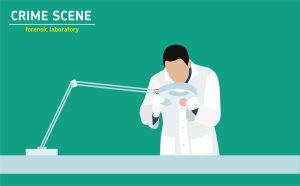
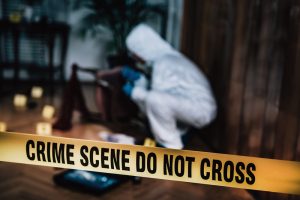
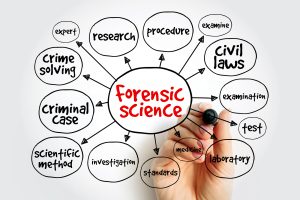
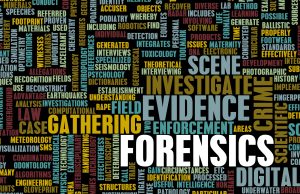
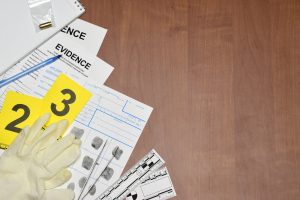

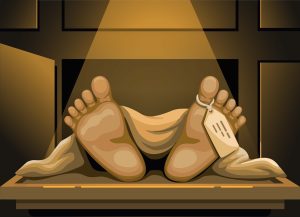
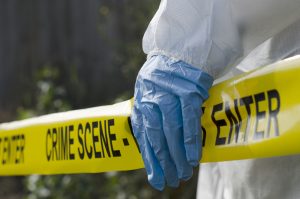
 What is Forensic Nursing?
What is Forensic Nursing?